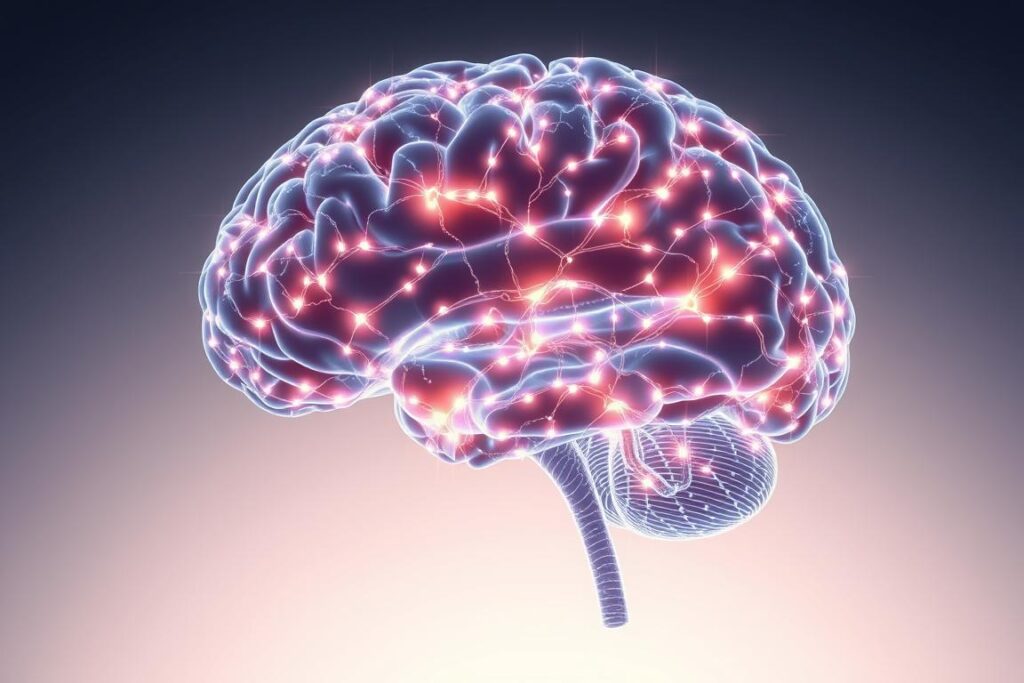What does science say? The positive effects of meditation on body and mind
In the last 15 years, research into the effects of meditation has increased enormously. Some meditation techniques have been removed from their traditional contexts and integrated into psychotherapeutic approaches.
These so-called mindfulness meditations are now used in many clinics to treat mental health problems. Studies by renowned scientists such as Dr. Richard J. Davidson have shown that regular meditation can bring about measurable changes in your brain.
Meditation can not only improve your mood, but also provide tangible health benefits. Find out in this article what science has discovered about the positive effects of meditation on your body and mind.
Important findings
- Regular meditation can bring about measurable changes in your brain.
- Meditation not only improves your mood, but also offers health benefits.
- Studies show the positive effect of meditation on various aspects of your well-being.
- Mindfulness meditation is used in clinics to treat mental health problems.
- The research behind meditation shows amazing results.
The science behind meditation: an overview
The science behind meditation is a fascinating field that is receiving more and more attention. In recent years, research into meditation has increased significantly, and scientists are using cutting-edge technology to study the effects of meditation on the brain.
The boom in meditation research
In the last 15 years, research into meditation has experienced a real boom. Scientists have conducted numerous studies to investigate the effects of meditation on body and mind. A recent comprehensive meta-analysis on the effects of meditation in healthy people found pronounced positive effects in almost all aspects examined.
- Research shows that meditation is more than just a spiritual trend.
- Neuroscience plays a crucial role in understanding the biological mechanisms through which meditation works.
- Studies show that meditation can have a supportive effect in the treatment of various illnesses.
How scientists measure the effects of meditation
Scientists today use state-of-the-art technologies such as MRI scanners and EEG to visualize the effects of meditation on your brain. These technologies can prove the link between regular meditation practice and measurable changes in the body.
For example, studies have shown that meditation can change brain structure, which is a fascinating example of the plasticity of your brain. Meta-analyses also show that meditation has particularly strong effects on your emotional world and less on cognitive aspects such as attention.
What is meditation? Definition and variety of practices
The world of meditation encompasses a wide range of practices that you can choose according to your needs and preferences. Meditation is a collective name for sometimes very different techniques that were and are important components in all world religions, especially in Hinduism and Buddhism.
Overview of different meditation techniques
There are different types of meditation that you can try. Some of the most well-known methods include breath observation, body awareness, mantra meditation and walking meditation. Each type of meditation has its own focus and effects.
- Breath observation: concentrate on raising and lowering your abdominal wall.
- Body awareness: Focus your attention on different parts of your body.
- Mantra meditation: Repeat a mantra to improve your concentration.
- Walking meditation: practise mindfulness while walking.
Mindfulness meditation: a modern approach
Mindfulness meditation is a modern approach that is particularly popular today. It teaches you to focus your attention on the present moment and to perceive it without judgment. One example of this is MBSR (Mindfulness-Based Stress Reduction), a program that combines various meditation techniques and has been well studied scientifically.
Regular meditation can improve your mood and strengthen your memory. Meditation plays an important role in world religions, but has often been detached from its spiritual context for modern use.
How meditation changes your brain
The practice of meditation has amazing effects on the structure and function of your brain. By meditating regularly, you can actively influence your brain and promote its plasticity.
Neuronal plasticity: your brain is reshaping itself
Your brain is not a rigid organ, but is constantly changing as a result of your experiences. Neuroscientists refer to this phenomenon as neuronal plasticity. Meditation plays an important role in this by positively influencing the structure and function of your brain.
Studies have shown that meditation can increase the density of gray matter in certain parts of your brain, especially in the hippocampus, an important part of the limbic system.

Structural changes in the brain through regular meditation
Regular meditation can lead to measurable changes in your brain. After an eight-week MBSR training program, an increase in grey matter in the hippocampus was observed. „This is part of the limbic system and is important for memory and the regulation of arousal in emotional situations,“ explains Dr. Hölzel.
Neuroscientists such as Dr. Richard Davidson have also shown that experienced meditators generate powerful gamma waves during meditation, which are related to learning and the synchronization of different areas of the brain.
The physical benefits of meditation
You can improve your physical health in many ways through regular meditation. Meditation has a positive effect on your body by reducing stress and promoting your general health.
Stress reduction and lowering blood pressure
Regular meditation can help to reduce stress, which is reflected in measurable changes in the stress hormones cortisol and cortisone in your body. Studies show that meditation can help in the treatment of high blood pressure – after just a few months of regular practice, your blood pressure can drop significantly.

This is because meditation techniques can relax the body and lower blood pressure, resulting in improved
Pain relief and anti-inflammation
Meditation can also help with pain management by changing your perception of pain. Through meditation you can become more aware of pain, but it is less stressful. In addition, the stress-reducing effect of meditation can help in the treatment of inflammatory diseases.
Your immune system also benefits from regular meditation, as chronic stress weakens the immune system and meditation counteracts this effect.
Meditation and your emotional health
Meditation is an effective way to strengthen your emotional health. Through regular practice, you can reduce negative emotions such as anxiety and depression and cultivate positive emotions such as compassion and joy.
Reducing anxiety and depression through meditation
One of the most significant effects of meditation on emotional health is the reduction of anxiety and depression. Studies have shown that meditation can be effective as a complementary treatment for anxiety disorders and depression. Dr. Britta Hölzel, a leading researcher in this field, has shown that meditation strengthens the regions of the brain responsible for regulating emotions.
By meditating regularly, you learn to be more aware of your emotions and react to them less automatically. This is an important part of emotional intelligence and can help you to alleviate anxiety and depression-related symptoms.
How you can train compassion and positive emotions
Compassion and positive emotions can be trained through special meditation techniques. Loving-kindness meditation (metta) is one such technique that helps you cultivate compassion, kindness and gratitude. A study by Dr. Richard J. Davidson and his team showed that just two weeks of compassion training made the test subjects act more altruistically and increased their well-being.
By developing compassion for yourself and others, you can strengthen your emotional health and build a positive connection with yourself and others. This is directly linked to an increased sense of well-being and a better overall mood.
Meditation in everyday life: practical applications
With meditation, you can make your everyday life more conscious and stress-free. Meditation is a flexible practice that can be easily integrated into your daily routine.
Simple meditation techniques for beginners
Breathing meditation is particularly suitable for beginners: sit comfortably, close your eyes and concentrate on your breath for 5-10 minutes without changing it. Another simple technique is the body scan, in which you systematically focus your attention on different parts of your body to relax them.
You can also start with guided meditations, for which there are numerous apps and online resources. These will help you get started with meditation and improve your practice.
Integrating meditation into your daily routine
Meditation can be integrated into your everyday life in many ways: as a formal sitting meditation, as a walking meditation during a walk or as mindful eating. An example of a simple everyday meditation is to take a minute before each meal to breathe consciously and focus your attention on the food.
Experienced meditators recommend making meditation a fixed part of your daily routine, for example in the morning after getting up or in the evening before going to bed. Even short meditation sessions of 5-10 minutes can have positive effects.
Conclusion: Meditation as a scientifically proven path to greater well-being
Meditation is more than just a trend – it is a scientifically proven way to achieve greater clarity and calm in everyday life. Regular meditation can have a positive impact on your health and well-being.
Research confirms that meditation has profound positive effects on your brain, body and mind. You can reduce stress, improve your emotional balance and increase your ability to concentrate.
Although meditation can sometimes be tedious, the long-term benefits for your physical and mental health are well worth it. The question of whether it’s worth starting to meditate can be answered with a clear „yes“ – your body and mind will thank you for it.






